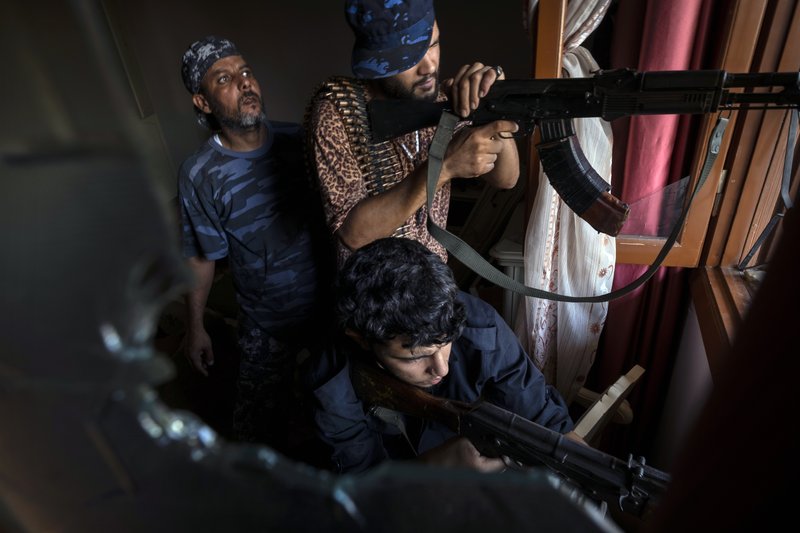CAIRO -- Syrian militants affiliated with groups such as al-Qaida and the Islamic State are currently being sent by Turkey to fight on behalf of the U.N.-supported government in Libya, according to two Libyan militia leaders and a Syrian war monitor.
Both sides in Libya's civil war receive equipment and backing from foreign countries. But Turkey, which has long trained and funded opposition fighters in Syria, has in recent months been airlifting hundreds of them over to a new theater of war in Libya.
The U.N.-supported government controls only a shrinking area of western Libya, including the capital, Tripoli. It's facing a monthslong offensive by forces loyal to Gen. Khalifa Hifter, who is allied with a rival government based in Libya's east. The United Nations recognizes the government in Tripoli, led by Prime Minister Fayez Sarraj, as Libya's legitimate government because it was born out of U.N.-mediated talks in 2015.
Sarraj is backed by Turkey and, to a lesser degree, by Qatar and Italy. Hifter receives backing from the United Arab Emirates and Egypt, as well as France and Russia. Libya has the ninth-largest known oil reserves in the world.
Libyan militia leaders in Tripoli said Turkey has sent more than 4,000 foreign fighters into Tripoli and that "dozens" of them are extremist-affiliated. The two commanders spoke on condition of anonymity because they were not authorized to discuss the matter with the media.
The U.N. has repeatedly condemned the flow of weapons and foreign fighters into Libya. But the organization has not directly responded to reports and accusations by Hifter's side that Sarraj's government and Turkey are using ISIS- and al-Qaida-linked extremists as mercenaries.
Turkey has not confirmed or denied reports of Syrian fighters being sent to Libya to support Sarraj, and the Turkish military did not respond to requests for comment.
However, in a televised interview last month, Turkish President Recep Tayyip Erdogan said: "As a combat force, we will have a different team there. They won't be from within our soldiers. Those different teams and the combat forces will work together. But our high-ranking soldiers will coordinate." He did not elaborate.
Syrian opposition leaders and Turkey's Libyan allies have denied any organized efforts to send combatants to Libya. But in January, Sarraj told the BBC that his government "would not hesitate to cooperate with any party to defeat this aggression" by Hifter's forces.
Rami Abdurrahman, the director of the Britain-based Syrian Observatory for Human Rights, said his war-monitoring network has determined there are at least 130 former Islamic State or al-Qaida fighters among the approximately 4,700 Turkey-backed Syrian mercenaries sent to fight for Sarraj.
He said the ISIS militants had joined the so-called Syrian National Army, a patchwork alliance formed by Turkey from different factions that battled the government of Syrian President Bashar Assad. Most of the groups are loyal to Turkey, and the Syrian National Army was used last year in Turkey's offensive against U.S.-allied Kurdish forces in northern Syria.
In theory, a cease-fire brokered by Russia and Turkey remains in place around Tripoli, but Libya's warring sides have traded accusations of violations, and the truce is threatened by clashes. Representatives from Sarraj and Hifter began meetings in Geneva on Tuesday to work toward a permanent cease-fire.
The Tripoli authorities and U.S. officials have accused Hifter of relying on hundreds of Russian mercenaries. And Sudanese armed groups from the Darfur region recently joined the fighting on both sides, according to a report by U.N. experts.
Nicholas Heras, a Syria expert at the Washington-based Institute for the Study of War, said Turkey is focusing on Libya to establish a sphere of influence in the Mediterranean.
"However, the Turks do not want to risk significant casualties to their own forces when the Turkish military has built a proxy force of Syrian fighters that can reinforce the Libyan fighters," he said.
Information for this article was contributed by Sarah El Deeb and Suzan Fraser of The Associated Press.
A Section on 02/06/2020
